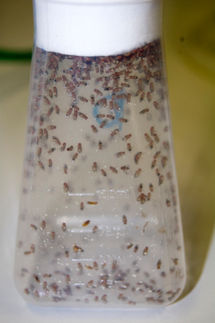Researchers Find Missing Genes of Ancient Organism
Yale scientists report in the journal Nature (Nature 433: 537-541) that the "missing" genes for tRNA in an ancient parasite are made up by splicing together sequences in distant parts of the DNA genome.
The research led by Professor Dieter Söll focuses on the most ancient organism with a known genome sequence. Nanoarchaeum equitans is a member of a new phylogenetic kingdom in the Archaea containing organisms that are primitive, parasitic and extremophile, or notable for living in the most extreme environments.
Surprisingly, Söll's team found that, although the genome of Nanoarchaeum lacks several intact tRNA genes, functional forms of those tRNAs can be made by copying from two distant DNA sequences-and joining them.
The regions on the separate pieces, that allow them to find each other and splice, are somewhat similar to internal sequences found in tRNA genes of more complex organisms. These regions, termed introns, are sequences that are cut out of whole gene transcripts during the process of tRNA maturation. The known tRNA introns in organisms like yeast, however, appear to have no function. Therefore, modern tRNA introns might be remnants of an old essential process of tRNA biosynthesis.
"These results may point to extremophiles in the kingdom of Archaea as predecessors of more modern organisms that have gained a genetic load in the process of evolution," said Söll. "Or they may represent a specialization that has rid itself of genetic baggage to exist in extreme environments."
Understanding how primitive organisms like Nanoarchaea operate gives clues to-but not proof of-the relationship between modern and ancient organisms.
Organizations
Related link
Other news from the department science

Get the life science industry in your inbox
By submitting this form you agree that LUMITOS AG will send you the newsletter(s) selected above by email. Your data will not be passed on to third parties. Your data will be stored and processed in accordance with our data protection regulations. LUMITOS may contact you by email for the purpose of advertising or market and opinion surveys. You can revoke your consent at any time without giving reasons to LUMITOS AG, Ernst-Augustin-Str. 2, 12489 Berlin, Germany or by e-mail at revoke@lumitos.com with effect for the future. In addition, each email contains a link to unsubscribe from the corresponding newsletter.


















































